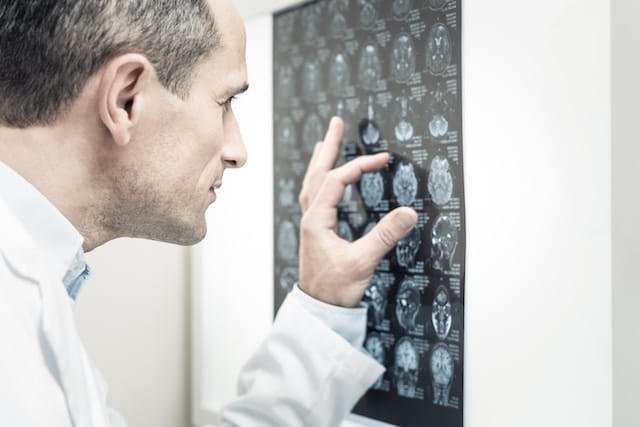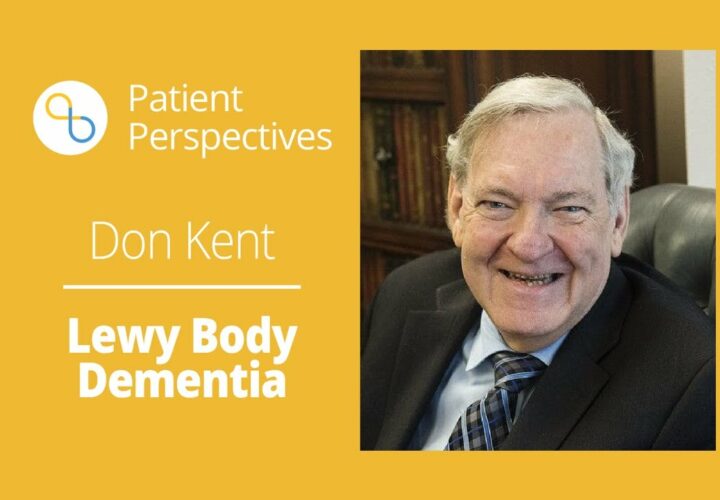Neurologists explain why different kinds of dementia are so hard to accurately diagnose, why it’s so critical to get your diagnosis right, and how to advocate for yourself until you get the answer.
One day, Don Kent’s personality started changing. A cool, even-keeled lawyer, he found himself suddenly losing control of his emotions. At the same time, he was experiencing fatigue — and he’d lost his sense of taste and smell. Kent went to see a neurologist for answers. Then another, then another. Over the course of several years, six different neurologists ruled out dementia, since Kent hadn’t (yet) experienced the hallmark symptom of memory loss. Eventually, however, he met his seventh neurologist, at the Mayo Clinic, and he finally received a diagnosis: Kent had Lewy body dementia.
Then there’s Michele Hall, an attorney who made several trips to see various doctors, trying to understand why she, an attorney in a hard-hitting job, was experiencing a sudden loss of ability to spell and recognize words. Doctor after doctor told her it was just stress. Hall, too eventually learned that wasn’t the case: She had early-onset Alzheimer’s disease.
Many people who are eventually diagnosed with dementia end up having similar experiences: Strange symptoms, a feeling that something is off, and a lot of time and trouble to get to an actual diagnosis. Unlike medical dramas like House, doctors don’t always go out of their way to solve the mystery. Sometimes, they dismiss patients’ concerns.
This becomes an enormous problem. In conditions like Alzheimer’s, frontotemporal dementia, and Lewy body disease, time is ticking. Brain cells continue dying off progressively while symptoms worsen.
An early diagnosis means more time from patients and their families to plan for the future. This might mean joining a clinical trial, adjusting their lifestyle, or spending more time with loved ones. Meanwhile a misdiagnosis could mean that patients receive the wrong medications, which can be ineffective, or even dangerous.
What makes dementia so difficult to diagnose accurately for experts and clinicians? And, as a patient, how do you advocate for yourself to get to that accurate diagnosis?
How often does a dementia misdiagnosis occur?
Brain health issues — especially neurodegenerative diseases — are complicated, and many of them have overlapping symptoms. Some can’t be definitively diagnosed until after a person dies, by looking at a brain in autopsy, while others — including Alzheimer’s disease and many other forms of dementia, can be definitively diagnosed.
Dementia misdiagnosis could mean that
patients receive the wrong medications, which can
be ineffective, or even dangerous.
When it comes to Lewy Body dementia in particular, a survey from the Lewy Body Dementia Association found that almost 75 percent of people were initially misdiagnosed. More than half were mistakenly diagnosed with Alzheimer’s. People with frontotemporal dementia are also routinely misdiagnosed with Alzheimer’s.
It is hard for scientists to estimate just how often misdiagnosis happens — and even harder to know how many people are living with dementia who are never diagnosed at all. A recent analysis of Medicare claims found that Black Americans were two times as likely as white Americans to be underdiagnosed with dementia.
They might be diagnosed with a different condition, like anxiety or depression, or simply leave the doctor’s office with no diagnosis at all. In fact, an estimated 41 million people worldwide, many of whom are 65 or older, live with dementia that goes undiagnosed altogether.
When dementia goes undiagnosed
Misdiagnosis by lack of diagnosis isn’t just a race issue. Some women perform better on certain verbal tests than men at baseline, which may make them less likely to receive a dementia diagnosis. Other groups of Americans are more likely to go undiagnosed. This includes people with functional or mobility impairments that have trouble getting to the appointment, as well as individuals who lack a high school education. In addition, people who attend appointments on their own are also less likely to receive a diagnosis as they might not be aware of some of the symptoms they’re experiencing.
So, why is a dementia diagnosis so hard to get right?
Why are doctors reluctant to diagnose dementia?
Why are doctors reluctant to diagnose dementia? Sharon Cohen, the clinician and director of the Toronto Memory Program has seen patients who received the wrong diagnosis because previous doctors were hesitant.
“Physicians often don’t like to pursue the diagnosis of Alzheimer’s and they will pick other things that might be coexisting, like depression or anxiety,” she told Being Patient. “But that doesn’t mean they don’t have Alzheimer’s.”
According to one study, many doctors feel unprepared to deliver the dementia diagnosis. The doctors had trouble explaining the disease honestly while still instilling hope. There is no playbook or specialized training for telling patients the news. That makes some doctors hesitant to name the disease until the symptoms get worse.
“Physicians often don’t like to pursue the diagnosis
of Alzheimer’s and they will pick other things
that might be coexisting, like depression or anxiety.
But that doesn’t mean they don’t have Alzheimer’s.”
–Sharon Cohen, Toronto Memory Program
“There is a reluctance on the part of some physicians to diagnose and name the disease,” Jason Karlawish, a professor of medicine, medical ethics, health policy and neurology at the University of Pennsylvania, and the co-director of the Penn Memory Center told Being Patient. “We just don’t have an adequate health care workforce to serve the needs of the many people who are experiencing cognitive changes.”
Diagnosing dementia is difficult, even for experts
Doctors need to rule out less-serious conditions before diagnosing dementia.
Cohen said this involves checking for low thyroid or vitamin B12 levels in the blood. This could cause temporary impairment and may be caused by another condition. A CAT scan or MRI can help rule out strokes or tumors.
It is also important to get an accurate medical history. Clinicians will speak to a “knowledgeable informant” — a family member, spouse, or caregiver — to get an accurate history.
“There is a reluctance on the part of some physicians
to diagnose and name the disease. We just don’t
have an adequate health care workforce to serve
the needs of the many people who are
experiencing cognitive changes.”
–Dr. Jason Karlawish, Penn Memory Center
After that, clinicians may run standardized cognitive tests. Even expert clinicians are unable to rely on the results of these cognitive tests alone. “When we diagnose Alzheimer’s disease without a confirmatory test, we are wrong about 30 percent of the time,” Cohen said.
Neurologist Marwan Sabbagh, director of the Cleveland Clinic calls this a diagnosis of exclusion. It assumes that Alzheimer’s or dementia is causing the memory symptoms, however it does not prove it definitively.
“Essentially, we fall into a diagnosis of Alzheimer’s by excluding other conditions, which turns out [to be] notoriously inaccurate in a diagnosis,” Sabbagh said in a Being Patient Live Talk. “And because of that, physicians don’t feel comfortable making a diagnosis.”
A spinal tap or a PET amyloid scan — an expensive procedure that is now covered by Medicare — are the only confirmatory tests available.
A diagnosis of Alzheimer’s or Lewy body dementia might not be specific enough.
Karlawish pointed to Alzheimer’s which has four different clinical subtypes. Each subtype has different symptoms with varying effects on patients’ quality of life. “For example, in people who have posterior cortical atrophy presentation would have prominent deterioration of visual perceptual abilities early on,” he said. “These patients are rarely told the differences and implications between their presentation and the other presentations of Alzheimer’s disease.”
The development of less invasive diagnostics — blood tests and retinal scans — could make it easier to make the right diagnosis. But these technologies are still in the works and aren’t yet fully approved.
Accurate diagnosis means getting the right treatment
While there aren’t any cures for Alzheimer’s or other dementias, there are drugs like Leqembi which may slow Alzheimer’s progression in the earliest stages. Plus, there are a number of medications prescribed to treat Alzheimer’s diseases’s cognitive and psychiatric symptoms. However, some medications aren’t well-tolerated in certain forms of dementia, Karlawish noted. A misdiagnosis might expose someone to more medical risks and worse overall symptom management.
Can you get a second opinion on dementia diagnosis?
It can take years of doctors’ visits to get the right dementia diagnosis for a variety of reasons. How can patients, families, and caregivers speed up the process?
According to Sabbagh, even when patients tell their doctors about red-flag neurological symptoms — as in Michelle Hall’s case — it’s not uncommon for those concerns to get dismissed.
“I am a sub-specialist neurologist — my day job is taking care of people with Alzheimer’s and other forms of dementia, but the fact is, I’m not the point of entry.” Sabbagh told Being Patient. “The point of entry is a patient going to their primary care physician. In many cases, [that physician] will downplay or dismiss [the patient’s concerns]: ‘Oh, there’s nothing wrong. Don’t worry about it. It’s that you’re depressed, or you’re having trouble sleeping,’ etcetera,” he said. “They should say, ‘OK, well, let’s evaluate it. Let’s refer you to a specialist so they can see what’s going on.’ That would be the best solution we can hope for.”
Can you get a second opinion on dementia diagnosis? Yes — and in fact, if you don’t feel confident in your diagnosis, experts say you should get a second opinion.
Sabbagh said he’d like to see physicians ask “What’s the worry and how often is it occurring?” and then go on to do at least a mini-cog test or other initial cognitive screening, just to screen them to ensure there’s nothing serious going on. If there is, that physician should route you to a specialist, he said. If that doesn’t happen at your appointment despite your concerns, he said, don’t give up on your intuition: Seek a second opinion.
“In many cases, [a physician] will downplay
or dismiss [a patient’s concerns]: ‘Oh, there’s
nothing wrong. Don’t worry about it. It’s that you’re
depressed, or you’re having trouble sleeping,’ etcetera,”
–Dr. Marwan Sabbagh, The the Cleveland Clinic
If patients feel that their doctor is being dismissive of their concerns, Cohen advises they ask for a memory assessment or a referral to a specialist. Meanwhile, Karlawish suggests looking for experts in diagnosing these conditions.
“You’re looking for a geriatrician, neurologist or psychiatrist who states they evaluate and care for persons with cognitive complaints as part of their practice,” Karlawish said.
“Always, you should get a second opinion when you’re facing a deadly disease or a disease with a poor outcome,” Dr. David Agus at the University of Southern California reminded the nation around a bizarre 2017 story of one healthcare provider issuing rampant false dementia diagnoses.
Self-advocacy and persistence can mean an earlier diagnosis — and seeking a second opinion — and sometimes a third — can help ensure an accurate one.
UPDATE, 20 November 2023: As of a landmark policy change in October 2023, Medicare now covers beta-amyloid PET scans for diagnosing Alzheimer’s disease.





I had the blood test and was told I tested positive for dementia (tau was found) but they said it isn’t 100% accurate. I’d like to know if they have a percentage of what the accurate rate is.
I personally know how difficult it was for me to get a diagnosis of Alzheimer’s, already suffering with depression it was put down to this . The test like asking who is prime minister, what day of the week is it, can you draw a clock with the hands at 10 to 2 simple questions like this, I was told because I passed this test everything is fine . After several tests and doctors telling me I’m okay, my Wife requested a scan of my brain and then I was diagnosed with Alzheimer’s disease, it all is about money, the costs of the CTScan , sadly the doctors still carry out these tests and telling unsuspecting patients that they are okay.
Excellent article! As an Early Stage Alz patient, having progressed from MCI, I’m great full I have a Neurologist who is thorough, and correctly diagnosed my particular type of dementia!
Please also consider vitamin b deficiency and normal pressure hydrocephalus can mimic some dementia symptoms. In many cases, dementia can be reversed for these conditions.